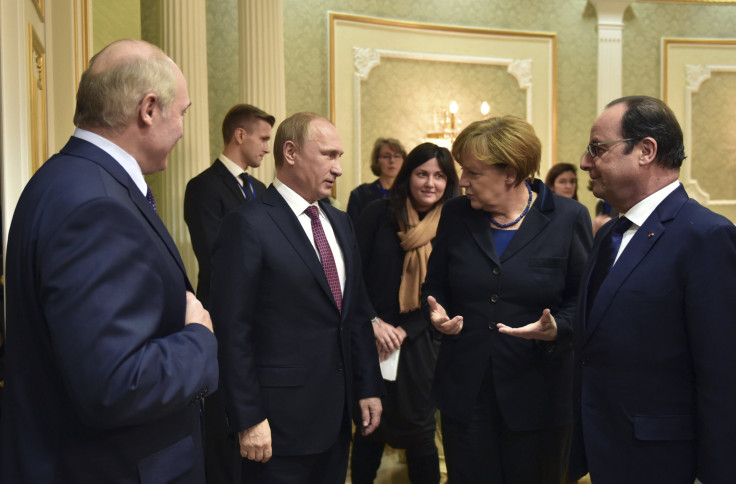Ukraine Minsk Meeting: Peace Talks Breed Skepticism After Continued Fighting, Failed First Accord

Ukraine peace talks in Minsk, Belarus, are in progress Wednesday, as the leaders of Russia, Ukraine, France and Germany have all arrived there to negotiate a lasting peace in eastern Ukraine. Continued fighting there and the impotency of a comprehensive resolution signed in Minsk in September raise questions about the effectiveness of any new truce deal.
As the much-anticipated peace talks get under way, some experts have looked to similar, unsuccessful instances in the past to forecast what is likely to emerge from Wednesday’s session. Those examples include Tuesday night's rumored ceasefire that was reportedly agreed upon by the Trilateral Contact Group (representatives from Ukraine, the separatists and the Organization for Security and Co-operation in Europe) that had apparently little to no effect as the Ukrainian army reported 19 soldiers were killed outside Debaltseve and at least 11 were killed in artillery strikes in Donetsk, a rebel city, on Wednesday, underscoring a lack of trust between the warring sides.
“One problem with [the September 2014 Minsk Accords] is it's good on paper, but separatists and their Russian backers have shown willingness to follow a twofold policy of making military moves underground and then moving separately on the negotiating table,” said Roman Popadiuk, who was U.S. ambassador to Ukraine in 1992 and 1993. “…They used the Minsk agreement as a cover-up. If you look at all the equipment and troops that have moved in since then, they have clearly stepped up support. Hopefully this is a true settlement and not a Minsk II, so to speak.”
Because of that, the Ukrainian government may be going into the talks with little negotiating power. Its military is outfitted with Soviet-era weapons and has lost more than 200 square miles of territory to separatists since September’s failed talks. That agreement was meant to set up a process to pull back heavy weaponry on both sides -- including the artillery that’s accounted for up to 60 percent of Ukrainian casualties -- and draw a demarcation line to start negotiations and give some kind of autonomous status to the two self-declared separatist republics of Donetsk and Luhansk.
Fighting has been particularly intense since the New Year, prompting more calls from all sides for a ceasefire, but on the ground both sides are pushing for key cities and territories ahead of the talks. Pro-Russian rebels maintained their pressure on Debaltseve, a central rail hub connecting the two rebel “capitals,” while Ukrainian-backed militia made a push on towns outside Mariupol, a significant port city that lies along a land route connecting rebel territory and the Russian-annexed Crimean peninsula. At least 12 people were killed, including seven civilians in a rocket attack on Tuesday in Kramatorsk, a government-controlled city around 50 kilometers (30 miles) from Debaltseve.
“There’s a couple of interpretations there,” said Jeff Mankoff, deputy director at the Center for Strategic and International Studies’ Russia and Eurasia program in Washington, D.C. “One is that they actually think there will be a deal and they’re both pushing to put themselves in a good a position as possible before the meeting, or two, nobody really believes the deal is happening and the logic is you just keep on doing what you’re doing.”
When leaders gathered in Minsk in September, the Ukrainian military had the separatists on their heels, but the rebels have pushed back since then, using a slew of weaponry that NATO and the U.S. say was supplied by Russia. Russia denies those allegations, but Nona Mikhelidze, a senior fellow at the Instituto Affari Internazionali in Rome, said there’s precedent for Russia’s alleged actions. “From the very beginning the Minsk agreement was destined to fail,” she said. “The same has happened with the six-point agreement between Georgia and Russia signed in the aftermath of the war of 2008. It has been never fulfilled from the Russian side.”
Russian troops invaded Georgia in 2008, annexed two ethnic minority territories and have been stationed there ever since. In the interim, Russian President Vladimir Putin has opened bilateral relationships with the two territories, South Ossetia and Abkhazia -- which are recognized by no other country -- angering their Georgian counterparts. That has complicated international efforts to re-establish economic cooperation between the countries. Some consider Georgia to be a precursor conflict to the Ukrainian crisis.
Ukraine’s defeats on the battlefield since the disintegration of the previous Minsk deal prompted Ukrainian President Petro Poroshenko to appeal for military aid from the U.S. and Europe. U.S. President Barack Obama publicly said he was weighing his options and that if diplomacy failed, he would ask his team to examine all options to “change Mr. Putin’s calculus.” The Kremlin quickly fired back, warning that if the U.S. supplied weapons, Russia would “respond asymmetrically against Washington or its allies on other fronts.”
“The Ukrainians have been willing to negotiate, but they don’t have anything really backing them, and this whole dual-track proposition [delivery of Western arms coupled with diplomacy] might be able to help them in negotiations,” said Popadiuk. “If the only thing they can offer is diplomacy, then Russia and the separatists have little reason to work with them.”
© Copyright IBTimes 2025. All rights reserved.






















